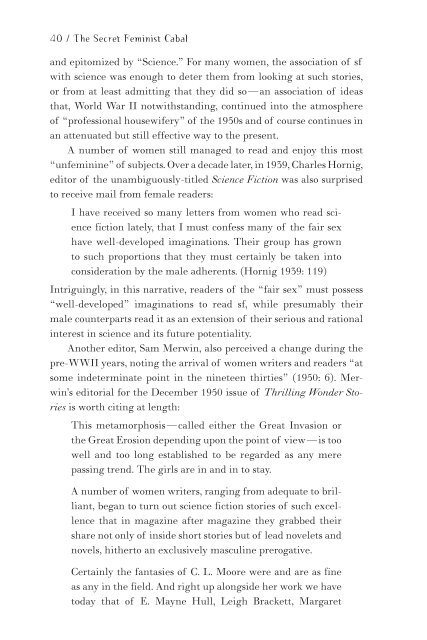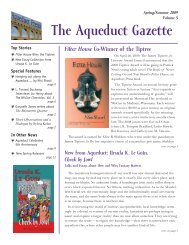Feminist Ca
Read Chapters Two and Three - Aqueduct Press
Read Chapters Two and Three - Aqueduct Press
- No tags were found...
Create successful ePaper yourself
Turn your PDF publications into a flip-book with our unique Google optimized e-Paper software.
40 / The Secret <strong>Feminist</strong> <strong>Ca</strong>bal<br />
and epitomized by “Science.” For many women, the association of sf<br />
with science was enough to deter them from looking at such stories,<br />
or from at least admitting that they did so — an association of ideas<br />
that, World War II notwithstanding, continued into the atmosphere<br />
of “professional housewifery” of the 1950s and of course continues in<br />
an attenuated but still effective way to the present.<br />
A number of women still managed to read and enjoy this most<br />
“unfeminine” of subjects. Over a decade later, in 1939, Charles Hornig,<br />
editor of the unambiguously-titled Science Fiction was also surprised<br />
to receive mail from female readers:<br />
I have received so many letters from women who read science<br />
fiction lately, that I must confess many of the fair sex<br />
have well-developed imaginations. Their group has grown<br />
to such proportions that they must certainly be taken into<br />
consideration by the male adherents. (Hornig 1939: 119)<br />
Intriguingly, in this narrative, readers of the “fair sex” must possess<br />
“well-developed” imaginations to read sf, while presumably their<br />
male counterparts read it as an extension of their serious and rational<br />
interest in science and its future potentiality.<br />
Another editor, Sam Merwin, also perceived a change during the<br />
pre-WWII years, noting the arrival of women writers and readers “at<br />
some indeterminate point in the nineteen thirties” (1950: 6). Merwin’s<br />
editorial for the December 1950 issue of Thrilling Wonder Stories<br />
is worth citing at length:<br />
This metamorphosis — called either the Great Invasion or<br />
the Great Erosion depending upon the point of view — is too<br />
well and too long established to be regarded as any mere<br />
passing trend. The girls are in and in to stay.<br />
A number of women writers, ranging from adequate to brilliant,<br />
began to turn out science fiction stories of such excellence<br />
that in magazine after magazine they grabbed their<br />
share not only of inside short stories but of lead novelets and<br />
novels, hitherto an exclusively masculine prerogative.<br />
Certainly the fantasies of C. L. Moore were and are as fine<br />
as any in the field. And right up alongside her work we have<br />
today that of E. Mayne Hull, Leigh Brackett, Margaret




